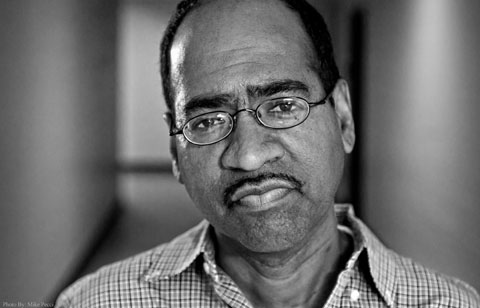
“This isn’t a basketball film — it’s about a real-life public school system, and the magnitude of that reality keeps smacking you in the face.” |
In 2007 (spoiler alert), the Madison Park High School hoops squad lost to a bunch of white boys from Braintree in a regional semifinals heartbreaker. The Boston squad — mostly comprising players from the Hub's grisliest housing projects — were by far the more talented bunch. But their lives off the court, which are captured in the documentary Push by Roxbury-bred director Rudy Hypolite, tragically impeded their athletic momentum. It's a story that's all too common in Boston and in inner-city schools everywhere. I asked Hypolite what it was like to film a train wreck in real-time, and about his opportunity to screen Push for the home team at this week's Roxbury International Film Festival.
WHY IS THIS SUBJECT PERSONAL FOR YOU? I grew up in the Academy Homes in Roxbury, and was placed in English High School in the middle of desegregation, so I've witnessed what has happened in schools here for a long time. I met [Madison Park coach] Dennis Wilson after he had been a guest on a show I did on Cambridge Community Television, where he was later the co-host on a sports show with me. He was always a charismatic interviewee, and would tell me stories about the challenges that he and the kids faced.
DID YOUR RELATIONSHIP WITH WILSON MAKE THINGS EASIER? When I decided that I wanted to do this, I told him that while we were friends, I didn't want him telling me what to film and what not to film. So he gave me and my crew carte blanche access. That's the only way this could have really been done.
DID YOU MAKE THIS MOVIE FOR THE COMMUNITY THAT IT REFLECTS, OR FOR PEOPLE FROM OUTSIDE OF URBAN AREAS WHO DON'T KNOW ABOUT THE CHALLENGES THAT THESE YOUNG PEOPLE FACE? Both. I wanted people from the city to feel like they're being given a voice, and to hopefully bring about change — whether politically, or educationally. There are good things happening around here, but the reality is that most of these kids fail, and we need to do things differently. As for people coming from outside experiences — I want them to see exactly what happens in this school system, and to get an understanding of why things are the way they are.
AT ONE POINT THERE'S THE REALIZATION THAT TWO STAR PLAYERS DON'T PASS TO ONE ANOTHER BECAUSE THEY'RE FROM DIFFERENT HOUSING PROJECTS. DID YOU HAVE TO LOOK FOR THESE METAPHORS? This was something that we didn't pick up on while we were filming. It really shows that you have to have an understanding of what these young people are going through at home to really understand what they're doing with their team, like not passing to each other. It's because they don't have much, and in their minds they have to keep the spotlight on themselves. They're not getting praised at home, so when they get mentioned in the newspaper, it's a big deal.